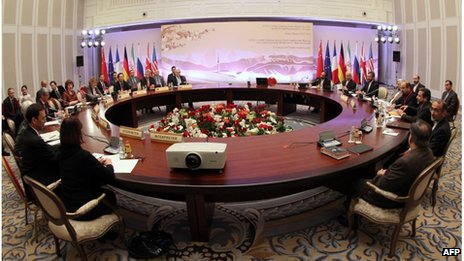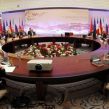
Kazakhstan Establishes Continuing Role in Iran Talks
Publication: Eurasia Daily Monitor Volume: 10 Issue: 39
By:

The February 26–27 round of the nuclear negotiations involving Iran and the P5+1 group (all five permanent UN Security Council members and Germany) in Almaty went as well as might have reasonably been expected. Nobody expected a breakthrough and none occurred. Yet, the sides met at a high level for the first time in months and they discussed detailed proposals as well as principles. The six powers suggested the consideration of a series of steps that would see increasing sanctions relief (the initial proposal was easing a ban on trade in precious metals like gold and relaxation of an import embargo on Iranian petrochemical products) in return for increasing constraints on Iran’s nuclear program (beginning with a suspension of uranium enrichment to a fissile concentration of 20 percent at its Fordow underground facility). (Gazeta.kz, February 27)
The Kazakhstani foreign ministry issued a press release stating that the session “contributed to the strengthening of mutual understanding between Iran and the group of international negotiators.” In particular, “Kazakhstan welcomes the decision of the parties to continue negotiations and stresses the necessity of solving the problem through peaceful, diplomatic means and the commitment of the Kazakhstani side to host the next meeting of the delegations in Almaty” (Tengrinews.kz, February 27)
Iranian Foreign Minister Ali Akbar Salehi struck a positive tone, saying that the discussions had reached “a turning point” in a positive direction and that he was “very optimistic and hopeful” that an outcome “satisfactory for both sides” would be reached (Press TV, March 1). Chief Iranian negotiator Saeed Jalili welcomed the fact that the other powers demonstrated a willingness to “get closer to the point of view of Iran” (RBK, March 1). Jalil added that Iran would continue to cooperate with the International Atomic Energy Agency (IAEA) in the interim (Gazeta.kz, February 27).
The goal expressed by the office of the Kazakhstani president, that the negotiations at least continue, was achieved (Kazakhstan Pravda, February 27). The parties agreed to return to Almaty for discussions on April 5–6 at the so-called “political directors” level (deputy ministers of foreign affairs). Before then, they would also hold expert-level discussions on March 17–18 in Istanbul to discuss the details of the confidence-building measures raised at the first Almaty session. An anonymous Western diplomat noted that the April meeting in Almaty would be critical since it remained to be seen whether the Iranians “are willing to engage seriously on the package [of confidence-building measures]” (Reuters, February 28). They would then discuss a sequence of reciprocal concessions leading to a final settlement.
The Kazakhstani media, while stressing that Almaty had simply provided a platform for the talks and not been a formal participant or mediator, also noted that “Kazakhstan began to acquire the status of a serious peacemaker,” building on its earlier achievements in this area (Kazpravda, March 1). Kazakhstan’s behind-the-scenes role might have been considerable. On the eve of the formal session, President Nursultan Nazarbayev met Jalili at his Almaty residence. According to the Acorda Press Service, he told Jalili that Kazakhstan—which still suffers from previous Soviet nuclear tests and wants to play an important role in global nuclear security—hoped to see a compromise settlement of existing disputes (Newskaz, February 25). Iran’s chief negotiator also met with Foreign Minister Erlan Idrisov and discussed the nuclear and regional security issues. Jalili said that Kazakhstan and Iran both opposed the proliferation of nuclear weapons. He also called on Kazakhstan to join Iran in preventing foreigners from interfering in regional security issues (Mehr, February 26).
Before the talks began, influential Kazakhstanis strove to induce Iran to compromise. For example, Roman Vassilenko, Deputy Director of the Nazarbayev Center, highlighted all the benefits that Kazakhstan had accrued by renouncing the nuclear weapons it had inherited from the Soviet Union: “For many years and from all platforms and forums, our president has been maintaining that Kazakhstan’s experience of voluntary abandonment of nuclear weapons, closure of the testing site and choice of a nuclear-weapons-free path helped it succeed as an independent state, win international recognition and attract huge volumes of investments totaling 160 billion; it shows how much more efficient a country’s peaceful development in cooperation with other countries can be, when sustainable socioeconomic and sociopolitical development are elevated above [the ownership] of nuclear weapons” (Tengrinews, February 25).
Vassilenko, a former senior official in the Kazakhstani foreign ministry, explained that Kazakhstan supports peaceful nuclear energy programs provided that they proceeded only in strict compliance with all IAEA requirements, such as openness and transparency. He added that Kazakhstan had a strong interest in a successful outcome of the negotiations. Vassilenko explained that a “stabilization of the situation in a large region depends on them” and that “Iran is our [Kazakhstan’s] neighbor across the Caspian Sea; we have dynamically developing trade and economic relations and a high-level political dialogue that is maintained on a regular basis” (Tengrinews, February 25).
Former Kazakhstani Foreign Minister Kanat Saudabayev said that the outcome represented “an important step in building trust and understanding between the parties and in enhancing an awareness of the need to solve problems by peaceful, diplomatic means.” Saudabayev, who is now Chairman of the Commission on weapons of mass destruction nonproliferation under the president, added that, “Even a little progress in this complex negotiation process should please us all.” He expressed that Kazakhstan “has established all the conditions” to make further progress, which is why the next round of political negotiations will occur in Almaty (Zakon, February 27).
Kazakhstan’s official role during this meeting and in subsequent rounds is essentially administrative, ensuring that all logistical arrangements work well and are conducive toward reaching an agreement. Yet, not many countries can fulfill this function. Iran and the other powers were unable to reach an agreement for months on where to resume their on-again, off-again talks. Since Iran and the United States have not had direct diplomatic relations since 1980, the selection of a neutral host country acceptable to both sides has become an important consideration in staging talks. Experts assessed that Kazakhstan was a logical venue for the talks given that country’s desire to promote understanding and cooperation between different regions, cultures, religions and other entities. Kazakhstan enjoys good ties with Iran and with the six major powers negotiating with Tehran on the nuclear issue.




